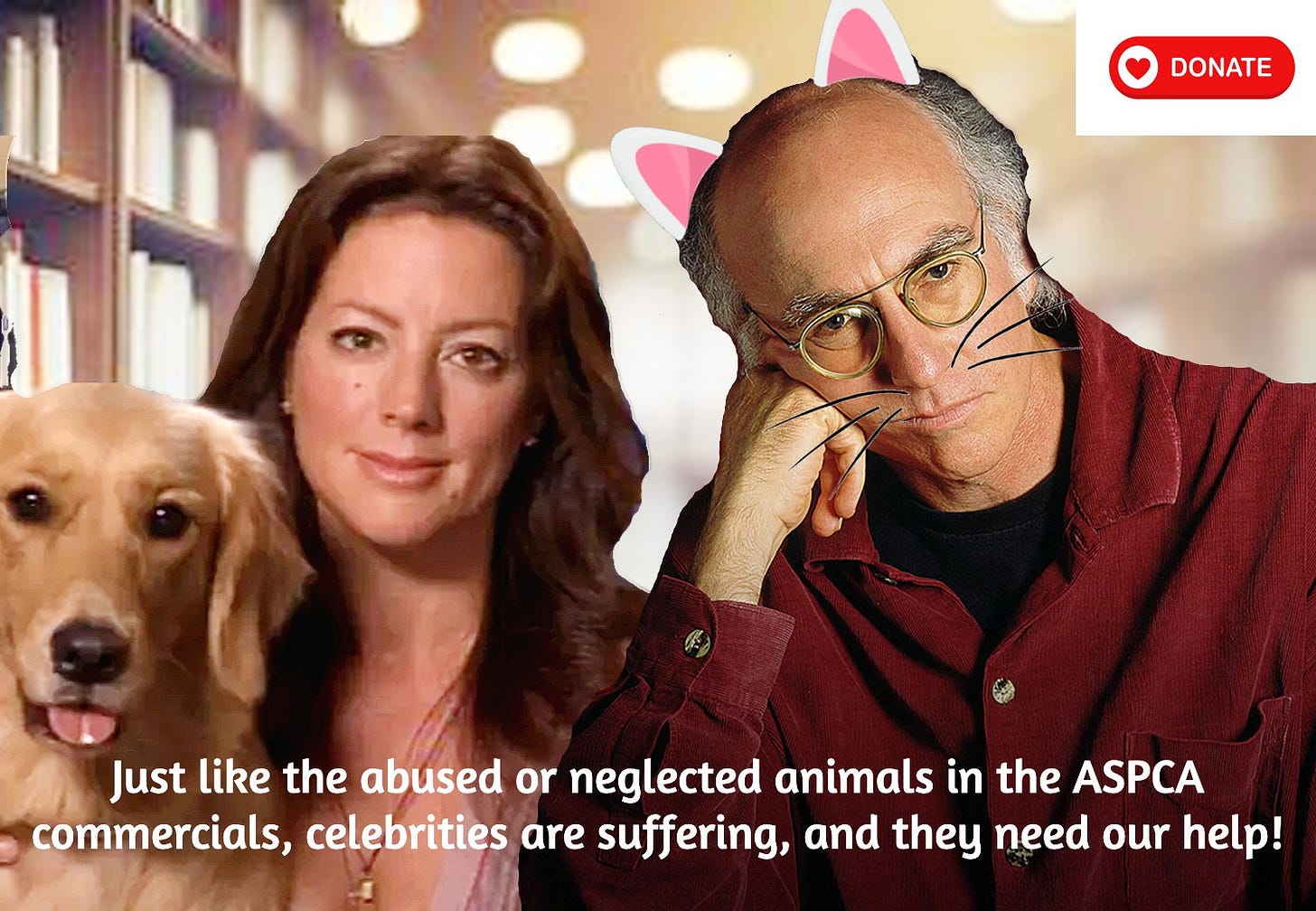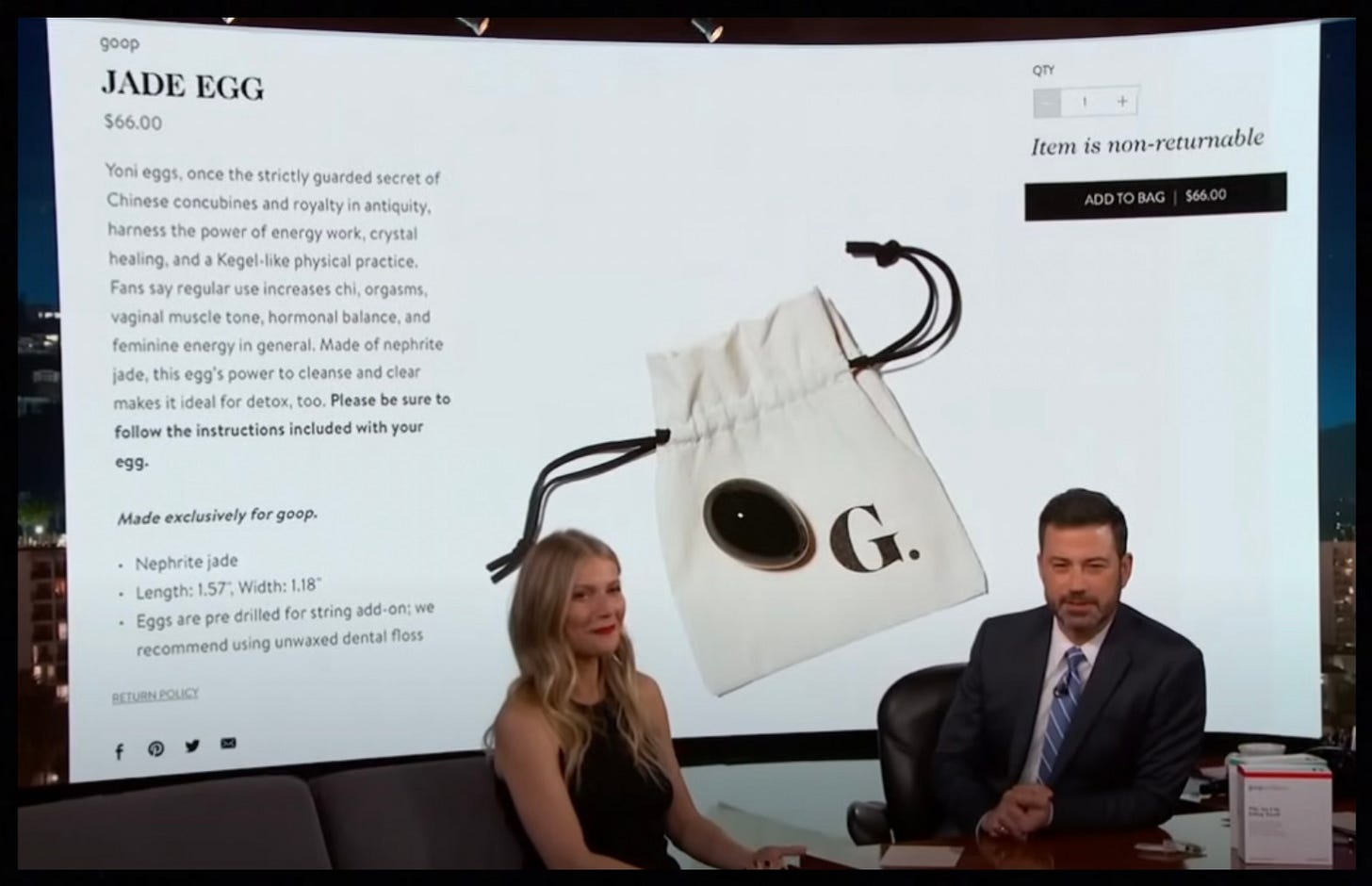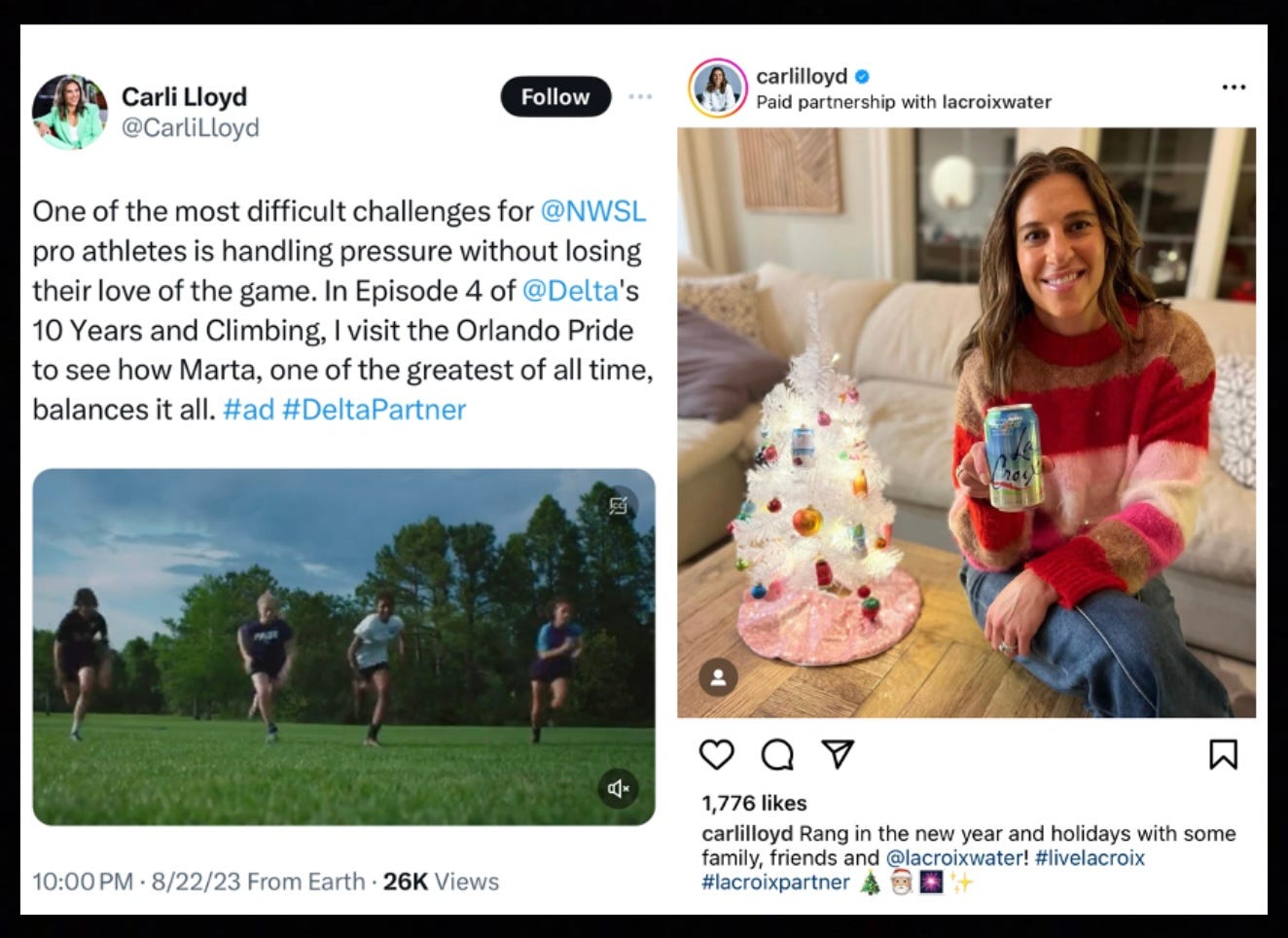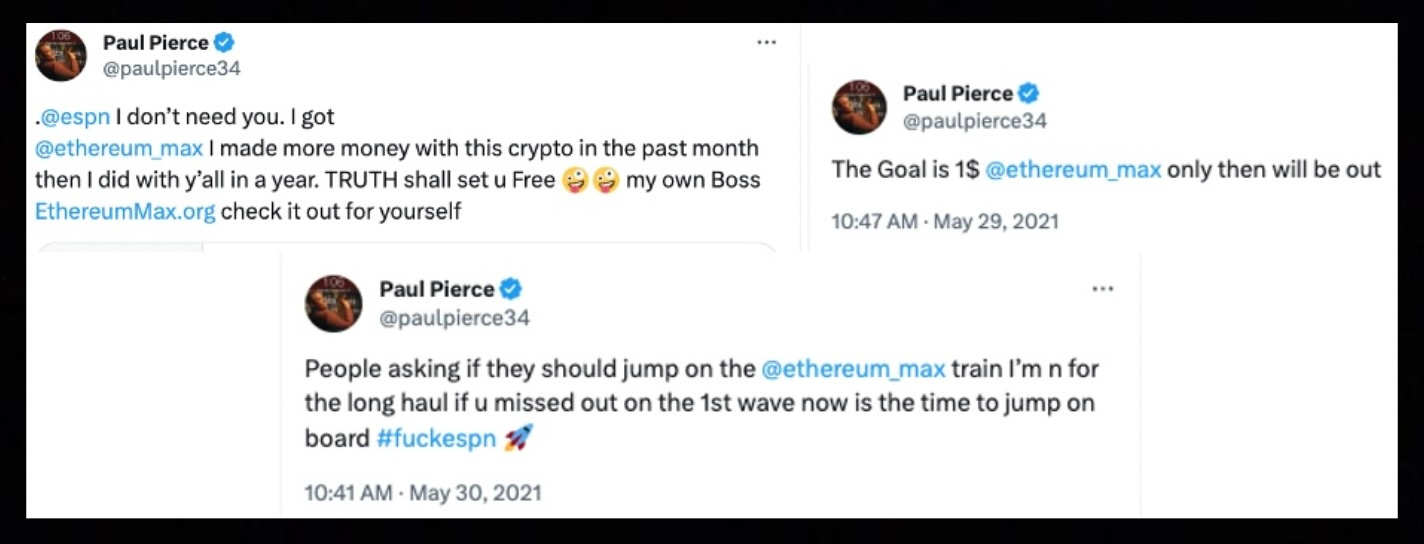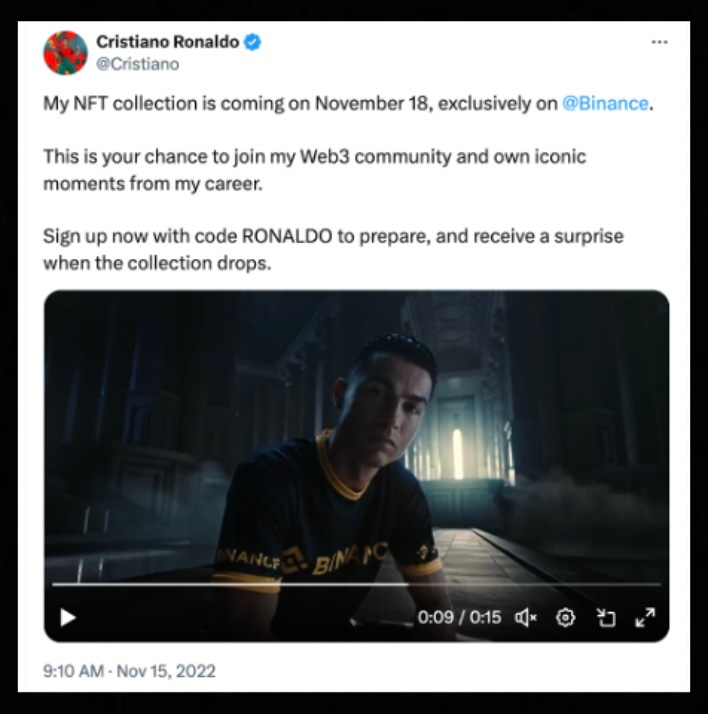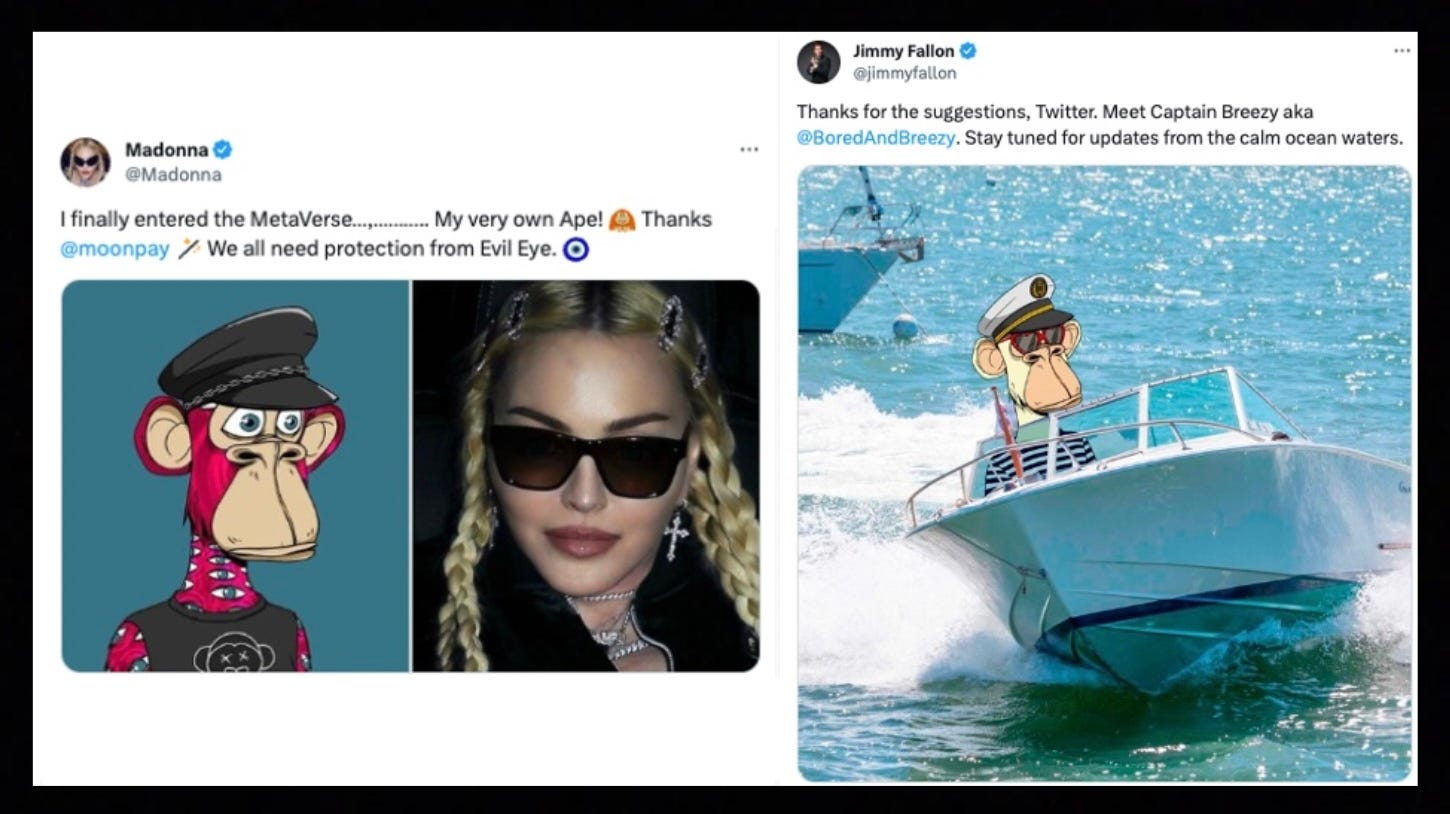The Price of Fame: Legal Pitfalls in Influencer Marketing
A public service announcement (PSA) for the world’s most vulnerable (i.e. celebrities and influencers)
[Mr. Whiskers (Larry David) appeared in a Super Bowl commercial for FTX. He was later sued in a class action lawsuit for allegedly defrauding investors who lost money in the cryptocurrency exchange’s collapse.]
Those Sarah McLachlan ASPCA commercials are some of the most effective, emotional blackmail infomercials ever created, extracting our hard-earned dollars to rescue some of the most helpless cats and dogs across the country. Similarly, and for just a few minutes of your time, you could impact the lives of those truly needing your help. I’m of course talking about the glitterati – our beloved celebrities and influencers.
Join the cause, not with wallet but with keyboard, to educate our other favorite obsessions (besides pets) on the mistakes of not complying with advertising laws when they do product endorsements. Every year, influencers and celebrities post their support of brands on their social media accounts, and companies exploit the person’s fame for promotional purposes. Oh, the horror! These adorable creatures with the memory of a goldfish (no offense, Dory) keep making the same mistakes and don’t learn from one another’s blunders. Let’s help them. After all, private islands and blow don’t come cheap.
Celebrities and influencers are generally most susceptible to lawsuits from these 3 sources: (a) the Federal Trade Commission, (b) the Securities and Exchange Commission, and (c) Class Action Litigants.
So, let's dive deep into the legalese, decipher the suits and penalties haunting our A-listers.
I. The Shift in Regulatory Focus from Traditional Marketing to Social Media
While social media advertising is largely subject to the same laws and regulatory principles as traditional marketing, celebrities often get into the most trouble with their tweets and posts. Why? Unlike a TV commercial or newspaper spread, influencers are effectively the medium themselves because the promotional platform (ex. Twitter or Instagram) remains under the control of the celebrity. This practice is a big change in the way companies reach their consumers. By leveraging celebrity influence, brands can now connect directly with their followers, creating more personal, targeted and effective advertising experiences. This shift has not gone unnoticed by regulators and class action litigants who are chomping at the bit to bring down our beloved superstars.
II. Federal Trade Commission: General Enforcer for Deceptive or Unfair Business Practices with Endorsements and Testimonials
The Federal Trade Commission (the “FTC”) is the general consumer watch dog agency that deals with anti-trust, consumer protection and competition issues.
A. The Law in a Nutshell: Section 5(a) of the Federal Trade Commission Act (the “FTC Act”) grants the agency the authority to protect consumers from fraudulent and deceptive advertising practices, which include endorsements, testimonials, sponsorships and partnerships.
B. Applying the Law to Celebrities: The FTC scrutinizes celebrity enforcements with a particular focus on:
Failure to disclose a relationship with a brand
Misleading, fraudulent, or dishonest statements regarding a product
Per the FTC’s Endorsement Guides, if there’s a “material connection” between a brand and its endorser (i.e. celebrity is being paid to promote something), the quid pro quo must be front and center. Why should I care, for example, if reality star Khloe Kardashian is being paid to endorse Old Navy jeans? Let’s say you are looking to buy a pair of denims and come across a tweet from Ms. Kardashian raving about the brand. Learning that she was paid to promote Old Navy jeans might make you weigh that tweet differently.
[Khloe Kardashian advertising Old Navy Jeans but not pointing out she’s being paid to promote it.]
Besides disclosing one’s relationship with a brand, influencers can't mislead the public and lie about liking a product they don't actually enjoy or haven’t actually used. Ads must be honest and reflect the genuine opinion of the promoter who should make sure claims can be backed up with solid proof. For example, if a celebrity touts the effectiveness of a health product, that claim can’t be so removed from what the science would show. One odd but helpful example was when actress Gwyneth Paltrow and her company Goop promoted the unsubstantiated claim that vaginal eggs could regulate menstrual cycles, prevent uterine prolapse, and increase bladder control.
[Gwyneth Paltrow promoting the vaginal egg on Jimmy Kimmel Live. Jimmy: “How does it help?” Gwyneth: “I don’t know. I need to start my jade egg practice.” Yikes: she should know better!]
C. Best Practices: Here’s what influencers should aim to do to comply with the FTC’s rules:
Clearly disclose they are promoting sponsored content. For social media, use hashtags like “#ad,” “#sponsored,” or “#partner” to indicate that the post is paid for. Don’t make it hard to find a hashtag. Best to put the disclosure at the top of the page and not buried in a group of hashtags.
Specifically for Instagram, the FTC has highlighted that a “material connection” should be disclosed above the “more” button because most people don’t click below that when scrolling through the platform.
Also, if you’re making an endorsement in a video, indicate it’s sponsored content in the video itself and not just in the description. If you are live streaming a video, repeat the disclosure periodically so that new viewers can hear it.
Use simple and clear language. Avoid vague words or abbreviations, such as “sp,” “spon,” or “collab,” or stand-alone terms like “thanks.”
Don’t promote a product you haven’t tried or make a claim that you know or should know isn’t scientifically true. You may swear that tiger blood will cure all ailments but keep that to yourself — for multiple reasons.
Leverage online resources from the FTC. The FTC has put together a pamphlet entitled “Disclosures 101 for Social Media Influencers.”
To help bring these best practices to life, here are some IRL examples of celebrity posts that miss and hit the mark:
Bad Practices: In tweets by singer Rihanna and wrestler Ric Flair, there are no disclosures about being paid to promote anything.
Better Practices: Soccer player Carli Lloyd’s tweet (left) showing “#ad #Delta Partner” makes it clear this is an ad; her Instagram post (right) indicates “Paid partnership” up top and “#lacroixpartner” at the end. Always a masterclass with Carli.
D. Costs for Noncompliance: After providing notice and observing continued bad behavior, the FTC can slap you with fines up to $50,120 per violation. Around 90% of the FTC’s consumer protection actions focus on financial services, web and telecommunications, healthcare and retail sectors. Usually, the FTC will alert the violator of the issue so s/he can fix the mistake, and it won’t go much further than that.
Even so, the FTC does actively police social media. Back in 2017, the FTC sent out more than 90 letters telling influencers that they needed to “clearly and conspicuously disclose their relationships to brands when promoting or endorsing products through social media.” More recently, the FTC sued and settled their first monetary settlement with celebrity endorsers Scott Yancey (Flipping Vegas on A&E) and Dean Graziosi (author of Millionaire Success Habits) for their involvement in promoting a scammy real estate training program. The influencers allegedly knew about customer complaints claiming the coaching programs were misleading and even attempted to plant fake, positive reviews online. Graziosi agreed to pay $1.25 million, and Yancey will pay $450,000. If a celebrity or influencer is particularly egregious, the FTC can get serious about it.
{Side note: the Supreme Court recently curtailed some of the FTC's powers. Per its ruling in AMG Capital Management, LLC v. FTC (2021), the FTC can no longer request a court to return money to injured consumers, a key tool under Section 13(b) of the FTC Act. Instead, the FTC is limited to seeking injunctions to halt illegal activities without the ability to provide monetary relief to consumers. However, the FTC still retains its penalty authority. As of this writing, there is sentiment in DC that a congressional fix is forthcoming, so keep an eye on this development in the future.}
III. The Securities and Exchange Commission: Defending the Financial Market Against the Promotion of Unregistered Securities, Inadequate Disclosures, Fraud or Misleading Statements
In addition to the FTC (a general consumer watchdog agency), other government agencies regulate various industries and their advertising practices based on their subject matter expertise. The Securities and Exchange Commission (the “SEC”) is the cop on the beat protecting investors and ensuring the securities market is fair, orderly and efficient. It enforces the registration of securities, disclosure of financial information, and monitoring financial professionals and firms.
A. The Law in a Nutshell: The Securities Act of 1933 (the “Securities Act”) and the Securities Exchange Act of 1934 (the "Exchange Act") empower the agency to guard consumers against being materially misled by advertisements during the sale of securities. Specifically, Section 17(b) of the Securities Act (known as the anti-touting provision) makes it unlawful to promote a security without disclosing the compensation for said endorsement. Additionally, Section 17(a)(2) of the Securities Act (aka the anti-fraud provision) outlaws extracting money or property from another person through materially untrue statements or the omission of a material fact.
{What is a security? For simplicity, think of it as a tradable financial asset like stocks, bonds, options, and shares.}
B. Applying the Law to Celebrities: Where celebrities often get into trouble here is twofold:
Promotion of an asset the SEC considers to be a “security” while failing to disclose a relationship with a brand
False or misleading statements about the sale of a security that would impact a decision to purchase a security
According to a 2017 statement from the SEC, an individual who promotes the sale of a security must disclose the “nature, scope, and amount of compensation received in exchange for the promotion” (in contrast to the FTC that doesn’t require a celebrity to reveal the actual amount). The SEC’s logic for the need for such disclosures is similar to that of the FTC. It should be clear and transparent if a promoter is compensated to make an endorsement, so consumers aren’t duped into thinking the promotion is impartial. Also, many celebrities (no offense) lack investment expertise and shouldn’t be giving investment advice.
Additionally, influencers are prohibited from making false or deceptive claims about a financial product or omitting crucial details that could prevent the information from being misleading, especially when offering or selling securities to investors. This rule is in place to prevent investors from making poorly-informed decisions based on incorrect or partial information. Ultimately, having transparency, honesty, and fairness in the securities market is essential for maintaining public trust and confidence in the financial system. Given the influence the glitterati can have on their followers, the SEC closely scrutinizes the movements of celebrities. After all, social media posts provide easily obtainable evidence.
Celebrities often get tripped up here with the promotion of a crypto and/or NFT project because their status as a security is hotly contested. Let’s take a look at the case of the basketball player Paul Pierce, a slam dunk case for the SEC. Pierce failed to disclose online that he was paid $244,000 to promote the EthereumMax platform and its token EMAX and never labeled his social media posts with “#ad.” [Kim Kardashian did the same thing.]
He went a step further and made many misleading statements to the public about his investment strategy. In a series of posts on Twitter, he bragged that he made more money with EMAX/crypto than anything else sharing a screenshot of his crypto wallet showing profits. He also remarked how he would only sell his EMAX if it got up to $1 per token and that he was in it for the long haul. All the while, Pierce was disposing of large quantities of EMAX received as payment for his promotions – a complete contradiction to his public claims. By making false statements that he was in it for the “long haul” and encouraging followers to “jump on board” while simultaneously profiting from token sales, the SEC accused Pierce of misleading his followers and engaging in deceptive behavior.
[Paul Pierce’s Twitter posts on all the money he was making by holding EMAX while actually he was selling. Someone needs to take his phone away]
C. Best Practices: Here’s what influencers should aim to do to comply with the SEC’s rules:
Ask yourself whether what you are promoting may be considered a security by the SEC. Very key. Taylor Swift knew better.
Perform due diligence on the company.
Disclose the nature, source and amount of compensation. The SEC requires you to disclose more than the FTC.
Don’t offer investment advice.
Make it clear you are doing an ad.
Don’t make false or misleading statements or statements you should have known to be false or misleading.
Avoid phrases that make it sound too good to be true, such as “incredible upside, little risk,” “breakout stock,” “guaranteed 100%”, or “opportunity is limited so hurry!”
D. Costs for Noncompliance: In my opinion, celebrities should be more worried about the SEC that is less forgiving than the FTC and has the power to impose huge fines. In its 2022 fiscal year, the SEC recovered a record $6.4 billion in penalties, disgorgement, and prejudgment interest, and $5 billion in the 2023 fiscal year. How the SEC arrives to a penalty is rather opaque as most settlements don’t detail the calculation of civil monetary penalties. As an example, Kim Kardashian settled with the SEC for $1.26 million, and Paul Pierce settled for $1.4 million for their promotion of EMAX.
Moreover, the SEC and other agencies often delight in the publicity they get for catching a big fish celebrity defendant – just ask Kim Kardashian. Going after a public figure helps spread the word to the public about what is considered bad advertising hygiene. The SEC has filed enforcement actions in recent memory for the above violations against Lindsay Lohan, Jake Paul, Soulja Boy, Kendra Lust, Lil Yachty, Ne-Yo, Austin Mahone, Akon, Floyd Mayweather Jr., DJ Khaled, Steven Seagal, to name a few. Bottom line: don’t mess with the SEC.
IV. Private Litigants and Class Action Lawsuits: Using Consumer Protection Laws to Bring Lawsuits for Damages
In addition to the government bringing an action, private actors can bring lawsuits against celebrities. Those suits can be brought for violations of either state law or federal law under similar legal logic to that of the government agencies.
A. State Law in a Nutshell: Individual states have their own laws on the books concerning deceptive and unfair trade practices, including the violation of securities laws (like the federal laws enforced by the FTC and SEC). Plaintiffs may utilize the state versions of these laws in addition to tort-related claims like conspiracy, conversion (theft), and aiding and abetting an unlawful act (let’s call them the “Kitchen Sink Torts”).
B. Applying the Law to Celebrities: Celebrities often get into legal trouble for:
Failure to disclose material connections
Misleading or fraudulent or dishonest statements regarding a product
Doing no. 1 and no. 2 when the promotion is for a security (including when they don’t realize something could be a security)
I think we get the legal concepts so let’s hop into an example. The renowned soccer player Cristiano Ronaldo promoted the platform Binance and an NFT collection called CR7 made in a collaboration during the 2022 World Cup. Ronaldo faced a $1 billion class action lawsuit for allegedly promoting an unregistered security and misleading consumers by failing to disclose his compensation from Binance, deceptive business practices, and the Kitchen Sink Torts. All these causes of actions were violations of Florida, Colorado and California laws.
[Cristiano Ronaldo’s Tweet on his NFT collection with Binance. He heavily promoted his NFT collection but allegedly failed to tell people he was being paid to do so.]
C. Federal Law in a Nutshell: In addition to state violations, celebrities can be sued by anyone under federal laws for securities fraud or manipulative or deceptive practices related to securities. Section 10(b) of the Exchange Act prohibits the use of any manipulative or deceptive methods in the purchase or sale of any security, in violation of SEC rules. Rule 10b-5, which is based on Section 10(b), further specifies that it is unlawful to commit fraud, make false material statements, or engage in any deceitful act or business practice in relation to the purchase or sale of securities.
D. Application to Celebrities: The famous often face class action suits related to the following:
Promotion of the sale of unregistered securities
Defrauding or misleading someone in the sale of securities
One epic example is the class action suit brought against Justin Bieber, Gwyneth Paltrow, Serena Williams, Paris Hilton, Madonna, Jimmy Fallon, and Kevin Hart, etc. for promoting Yuga Labs’ Bored Ape NFTs. Sounds like an overly clever theme for the Met Gala! The plaintiffs accused multiple celebrities of scheming to inflate the NFT values via endorsements without the proper disclosure of the financial relationships. Folks like Madonna allegedly misled the public about their actual involvement and others like Jimmy Fallon allegedly feigned their interest in the collection for their own personal gain.
[Madonna tweeted (left) “Thanks @moonpay” but didn’t say if she was paid to promote Bored Apes. Jimmy Fallon through his tweets (right) and TV program, was accused of giving the impression he was “involved” in this project and like the Ape in his tweet, would help captain this NFT ship.]
C. Costs for Noncompliance: With a private right of action, you can seek damages, restitution, and other remedies. The first lesson you learn in law school is that you never sue a turnip; you sue a tomato. If you squeeze a turnip, it doesn’t yield much juice, but a tomato has a large projectile range.
Here’s the difficult part of being an influencer or celebrity: because people think you have money, you are very much a tomato. Defending these suits can be expensive, and settling is often preferred to avoid the expense, time, and negative publicity. It can be costly to defend a lawsuit and pay for a ghost detector, a dinosaur skull, a $2 million humidifier…ok maybe, I don’t feel so bad. Many lawyers make a whole career out of that…some of us do Substacks for free…
V. Conclusion
What can you do to help Tom Brady, Cristiano Ronaldo, Lindsay Lohan, among other glitterati? Tweet them this article. You sliding into their DMs with this PSA could save them some money and us plebeians from having to witness uncomfortable (perhaps, disingenuous) public displays of remorse. Act now!
VII. Extra Credit
I want to note for you readers who made it this far, the above isn’t completely exhaustive of every potential pitfall a celebrity may face in their promotion of a product. Celebrities should be careful about endorsing any product in a highly regulated industry – see below:
Like the SEC, the Commodity Futures Trading Commission (CFTC) also requires individuals promoting trading advice to disclose that they have received compensation.
The Federal Reserve Board takes action when unfair or deceptive acts or practices are discovered in the banking and financial services industry.
The Food and Drug Administration (FDA) regulates advertising for prescription drugs, certain medical devices, such as hearing aids, the lasers used in LASIK procedures, and contact lenses. It has issued guidance on internet/social media platforms.
Financial Industry Regulatory Authority (FINRA), while a self-regulatory organization (SRO), regulates broker-dealers’ communications. It also has issued guidance to influencers on social media practices.
Sources:
AMG Capital Management, LLC v. FTC is 593 U.S. _ (2021), https://www.supremecourt.gov/opinions/20pdf/19-508_l6gn.pdf
15 U.S. Code § 45 (Section 5 of the Federal Trade Commission Act), Unfair methods of competition unlawful; prevention by Commission, https://www.law.cornell.edu/uscode/text/15/45
12 U.S.C. § 1818 (Section 8 of the Federal Deposit Insurance Act), Termination Of Status As Insured Depository Institution, https://www.fdic.gov/regulations/laws/rules/1000-900.html
15 U.S.C. § 78j(b) (Section 10(b) of the Exchange Act), Manipulative and deceptive devices, https://www.law.cornell.edu/uscode/text/15/78j
15 U.S. Code § 77q(a)(2) (Section 17(a)(2) of the Securities Act) - Fraudulent Interstate Transactions, https://www.law.cornell.edu/uscode/text/15/77q
15 U.S. Code § 77q (Section 17(b) of the Securities Act) - Fraudulent Interstate Transactions, https://www.law.cornell.edu/uscode/text/15/77q
15 U.S. Code § 77e (Sections 5(a) and 5(c) of the Securities Act) - Prohibitions Relating To Interstate Commerce and the Mails, https://www.law.cornell.edu/uscode/text/15/77e
California Securities Law, California Corp. Code § 25110, https://law.justia.com/codes/california/2007/corp/25110-25118.html
California’s Unfair Competition Law Business & Professions Code, §§ 17200, https://leginfo.legislature.ca.gov/faces/codes_displaySection.xhtml?sectionNum=17200.&lawCode=BPC
Florida Securities and Investor Protection Act, Section 517.07(1), Fla. Stat., http://www.leg.state.fl.us/Statutes/index.cfm?App_mode=Display_Statute&Search_String=&URL=0500-0599/0517/Sections/0517.07.html#:~:text=(1)%20It%20is%20unlawful%20and,registered%20pursuant%20to%20this%20chapter.
Florida Deceptive and Unfair Trade Practices Act, Section 501.201, Fla. Stat., http://www.leg.state.fl.us/Statutes/index.cfm?App_mode=Display_Statute&URL=0500-0599/0501/Sections/0501.201.html.
17 CFR § 4.41 - Advertising by commodity pool operators, commodity trading advisors, and the principals thereof, https://www.law.cornell.edu/cfr/text/17/4.41
88 FR 48102, Guides Concerning Use Of Endorsements And Testimonials In Advertising, https://www.ecfr.gov/current/title-16/chapter-I/subchapter-B/part-255
Federal Trade Commission, FTC Staff Reminds Influencers and Brands to Clearly Disclose Relationship, April 19, 2017, https://www.ftc.gov/news-events/news/press-releases/2017/04/ftc-staff-reminds-influencers-brands-clearly-disclose-relationship
Federal Trade Commission, FTC's Endorsement Guides: What People Are Asking, https://www.ftc.gov/business-guidance/resources/ftcs-endorsement-guides-what-people-are-asking
Federal Trade Commission, What the FTC Does, https://www.ftc.gov/news-events/media-resources/what-ftc-does
Federal Trade Commission, FTC Publishes Inflation-Adjusted Civil Penalty Amounts for 2023, January 6, 2023, https://www.ftc.gov/news-events/news/press-releases/2023/01/ftc-publishes-inflation-adjusted-civil-penalty-amounts-2023?utm_source=govdelivery
Federal Trade Commission, Advertising without proper proof can prove costly under new Notice of Penalty Offenses, Lesley Fair, April 13, 2023, https://www.ftc.gov/business-guidance/blog/2023/04/advertising-without-proper-proof-can-prove-costly-under-new-notice-penalty-offenses
Federal Trade Commission, Disclosures 101 for Social Media Influencers, November 2019, https://www.ftc.gov/business-guidance/resources/disclosures-101-social-media-influencers
Federal Trade Commission, FTC Seeks to Add Real Estate Investment Celebrities Dean Graziosi and Scott Yancey as Defendants in Real Estate Training Case, August 31, 2020, https://www.ftc.gov/news-events/news/press-releases/2020/08/ftc-seeks-add-real-estate-investment-celebrities-dean-graziosi-scott-yancey-defendants-real-estate
Federal Trade Commission, FTC Suit Leads to $16.7 Million Judgment Against Principals and Celebrity Endorsers of Real Estate Investment Training Program, May 22, 2023, https://www.ftc.gov/news-events/news/press-releases/2023/05/ftc-suit-leads-167-million-judgment-against-principals-celebrity-endorsers-real-estate-investment
Securities and Exchange Commission, Investor Alert: Social Media and Investing - Avoiding Fraud, https://www.sec.gov/investor/alerts/socialmediaandfraud.pdf
Securities and Exchange Commission, SEC Statement Urging Caution Around Celebrity Backed ICOs, November 1, 2017, https://www.sec.gov/news/public-statement/statement-potentially-unlawful-promotion-icos
Federal Reserve Board, Federal Trade Commission Act Section 5: Unfair or Deceptive Acts or Practices, December 2016, https://www.federalreserve.gov/boarddocs/supmanual/cch/ftca.pdf
Food and Drug Administration (FDA), Prescription Drug Advertising | Questions and Answers, June 19, 2015, https://www.fda.gov/drugs/prescription-drug-advertising/prescription-drug-advertising-questions-and-answers#:~:text=The%20Federal%20Trade%20Commission%20(FTC,LASIK%20procedures%2C%20and%20contact%20lenses.
Food and Drug Administration (FDA), Guidance for Industry Internet/Social Media Platforms with Character Space Limitations— Presenting Risk and Benefit Information for Prescription Drugs and Medical Devices, June 2014, https://www.fda.gov/regulatory-information/search-fda-guidance-documents/internetsocial-media-platforms-character-space-limitations-presenting-risk-and-benefit-information-0
Financial Industry Regulatory Authority (FINRA), FINRA Provides Update on Sweep: Social Media Influencers, Customer Acquisition and Related Information Protection, February 2023, https://www.finra.org/rules-guidance/guidance/targeted-examination-letters/sweep-update-feb2023
Skadden, Arps, Slate, Meagher & Flom LLP and Affiliates, FTC Enforcement Trends in Consumer Protection Under the Biden Administration, Anthony J. Dreyer, Margaret E. Krawiec, Paul M. Kerlin and Todd D. Kelly, December 13, 2023, https://www.skadden.com/insights/publications/2023/12/2024-insights/enforcement-and-litigation/ftc-enforcement-trends#:~:text=FTC%20has%20significantly%20affected%20FTC,seek%20monetary%20and%20injunctive%20relief
Skadden’s The Rise And Reformation Of Private Securities Litigation, Jay B. Kasner and Mollie M. Kornreich, August/September 2014, https://www.skadden.com/-/media/files/publications/2014/08/lit_augsept2014_securitieslitigation.pdf
Arnall Golden Gregory LLP, FDA Is (Once Again) Keeping Up With the Kardashians: A Cautionary Tale Involving Endorsements, Testimonials and Influencer Marketing, Matthew V. Wilson, March 19, 2021, https://www.agg.com/news-insights/publications/fda-is-once-again-keeping-up-with-the-kardashians-a-cautionary-tale-involving-endorsements-testimonials-and-influencer-marketing/
Holland & Knight, 2023 Social Media Advertising Landscape: An Update from a Senior FTC Official, April 18, 2023, Anthony E. DiResta, Da'Morus A. Cohen, Benjamin A. Genn, and Luis Garcia, https://www.hklaw.com/en/insights/publications/2023/04/2023-social-media-advertising-landscape
Morrison Foerster, The Guide To Social Media And The Securities Laws, August 2017, https://media.mofo.com/docs/pdf/170814-guide-to-social-media-and-the-securities-laws/82092FCB23EF590F76E3D38EF281CFF6/170814-guide-to-social-media-and-the-securities-laws.pdf
American Bar Association, Social Media Endorsement Activities Can Prompt Securities and Exchange Commission Liability for Celebrities, Michael J. Rivera and Abby Yi, May 12, 2021, https://www.americanbar.org/groups/entertainment_sports/publications/entertainment-sports-lawyer/esl-37-01-winter21/social-media-endorsement-activities-can-prompt-securities-and-exchange-commission-liability-celebrities/
The Importance of the ‘How’ and the ‘Why’ in SEC Settlement Penalty Calculations, Michael J. Osnato Jr., Meaghan Kelly and Stephanie Hon, December 01, 2023, https://www.law.com/newyorklawjournal/2023/12/01/the-importance-of-the-how-and-the-why-in-sec-settlement-penalty-calculations/
Sarah McLachlan ASPCA Commercial, YouTube
Celebrity Lawsuits:
SEC v. Paul Anthony Pierce, Order Instituting Cease-And-Desist Proceedings, https://www.sec.gov/files/litigation/admin/2023/33-11157.pdf
SEC v. Kimberly Kardashian, Order Instituting Cease-And-Desist Proceedings, https://www.sec.gov/files/litigation/admin/2022/33-11116.pdf
Michael Sizemore v. Cristiano Ronaldo, US District Court of the Southern District of Florida, November 11, 2023, https://www.tbstat.com/wp/uploads/2023/11/ronaldo.pdf
Adonis Real and Adam Titcher v. Yuga Labs, Inc., et. al., US District Court of the Central District of California, https://deadline.com/wp-content/uploads/2022/12/CELEBS-NFT-SUIT.pdf
Celebrity Promotions:
Ric Flair Tweet: https://twitter.com/ricflairnatrboy/status/1742573643673018583?t=0SfwUepwmhm_JDYyzO6lXg
Khloe Kardashian Tweet: https://twitter.com/khloekardashian/status/28907554676?lang=ar-x-fm
Rihanna Tweet: https://twitter.com/rihanna/status/1690074315688185856
Carli Lloyd Tweet and Instagram Post: https://twitter.com/CarliLloyd/status/1694024295700213869 & Instagram Post
Gwyneth Paltrow on Squatting, Earthing & That Special Egg for 'Lady Parts': YouTube
Kim Kardashian Instagram Post: https://www.goingconcern.com/sec-order-kim-kardashian-emax-tokens/
Paul Pierce Tweets: https://twitter.com/paulpierce34/status/1397628485917577217?lang=en; https://twitter.com/paulpierce34/status/1398294745806299139; https://twitter.com/paulpierce34/status/1398652340610080770 & https://twitter.com/paulpierce34/status/1399013195151417345
Cristiano Ronaldo Tweets and YouTube Video: https://twitter.com/Cristiano/status/1539972040291061765; https://twitter.com/Cristiano/status/1592520297290551308; & YouTube
Jimmy Fallon Tweet: https://twitter.com/jimmyfallon/status/1463166515289669650?lang=en
Paris Hilton Surprises Tonight Show Audience Members By Giving Them Their Own NFTs | Tonight Show: YouTube
Madonna Tweet: https://twitter.com/Madonna/status/1507183071551971330
Celebrity Gossip:
Gwyneth Paltrow's Goop brand penalized for 'unsubstantiated claims', September 5, 2018, https://abc7chicago.com/gwyneth-paltrow-goop-penalties-health-claims/4154422/
14 of the Most Ridiculous Celebrity Purchases, April 13, 2023, https://www.cosmopolitan.com/entertainment/celebs/g43402256/14-of-the-most-ridiculous-celebrity-purchases/
Lindsay Lohan, Jake Paul, Lil Yachty, other celebs hit with SEC charges for boosting crypto, Brian Contreras, March 22, 2023, https://www.latimes.com/entertainment-arts/business/story/2023-03-22/lindsay-lohan-lil-yachty-akon-and-other-celebs-charged-for-boosting-crypto#:~:text=Those%20charged%20included%20%E2%80%9CMean%20Girls,named%20in%20the%20agency's%20complaint.
Disclaimer: This post is for general information purposes only. It does not constitute legal advice. This post reflects the current opinions of the author(s). The opinions reflected herein are subject to change without being updated.



